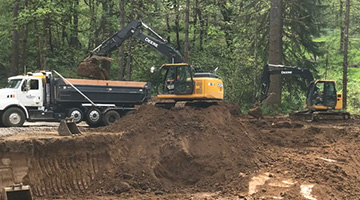Economical Lancaster Excavation - Top Quality Excavation at Competitive Costs
Economical Lancaster Excavation - Top Quality Excavation at Competitive Costs
Blog Article
Comprehensive Excavation Strategies: Understanding the Basics for Success
In the realm of building and civil design, the value of efficient excavation strategies can not be overstated. The careful preparation, precise implementation, and thorough interest to detail required in excavation jobs demand a comprehensive technique that incorporates numerous essential aspects. From first soil evaluation to the implementation of precaution and routine development tracking, mastering these core components is essential for achieving success in any excavation endeavor. The real proficiency lies not just in comprehending these fundamentals yet in seamlessly incorporating them to navigate the complexities of excavation projects with skill.
Recognizing Excavation Project Planning

Successful excavation tasks are improved the foundation of comprehensive and thorough preparation. The preliminary phase of any type of excavation task is the preparation phase, where critical choices are made that can considerably influence the result of the job. Throughout this stage, it is necessary to gather all relevant information about the website, consisting of topographical surveys, soil composition, and any type of potential dangers that might exist. Recognizing the job timeline, range, and budget plan constraints is vital for creating a thorough excavation strategy that makes sure the task's success.
One key aspect of excavation task planning is the development of a detailed timeline that outlines the sequence of tasks, turning points, and target dates. This timeline offers as a roadmap for the job group, enabling them to track progression and make necessary adjustments to ensure the task stays on timetable. In addition, a distinct budget that represents all expenditures, including equipment rental, labor costs, and products, is crucial for staying clear of expense overruns and hold-ups. By thoroughly thinking about all these aspects throughout the drawing board, excavation projects can be implemented efficiently and properly, leading to effective results.
Soil Evaluation and Site Analysis
Carrying out extensive soil evaluation and site analysis is an important action in the preparation stage of any excavation task. Dirt evaluation entails identifying the structure, framework, and properties of the dirt at the excavation site. This details is critical for understanding the soil's bearing capacity, wetness material, and possibility for disintegration, which are essential variables in establishing the excavation techniques and equipment needed for the task.
Site evaluation goes past dirt analysis and incorporates a broader assessment of the total website conditions. This analysis consists of recognizing any kind of potential threats, such as below ground energies, ecological issues, or unpredictable terrain, that can impact the excavation process. By thoroughly examining the site, project supervisors can create reliable excavation methods that focus on safety, efficiency, and environmental management.
Utilizing sophisticated technologies like ground-penetrating radar, dirt sampling, and drone surveys can enhance the precision and performance of soil evaluation and site evaluation. Spending time and resources in these initial steps can ultimately save time and prevent pricey delays or issues during the excavation procedure.
Equipment Option and Usage
Efficient excavation jobs depend greatly on tactical equipment choice and utilization to ensure ideal performance and my review here efficiency. Picking the ideal tools for the work is essential in optimizing efficiency and decreasing downtime. Aspects such as the type of soil, depth of excavation, and job extent play a substantial role in identifying one of the most appropriate tools for the task available.
In enhancement to picking the suitable tools, correct usage is key to job success. Operators must be educated to handle the tools securely and efficiently - septic ohio. Normal upkeep checks and prompt repairs assist stop break downs and make sure constant efficiency throughout the job
Precaution and Laws Conformity
In the realm of excavation tasks, prioritizing precaution and conformity with policies is vital to making certain a safe and lawfully sound functional atmosphere. Precaution encompass a range of methods, including performing thorough website analyses, implementing proper signage and barriers, and providing sufficient safety training for all workers associated with the excavation process. Adherence to guidelines, such as OSHA needs in the USA, makes sure that the excavation task meets the necessary standards to safeguard workers, bystanders, and the surrounding atmosphere.

Monitoring Progress and Adjusting Strategies
Exactly how can project managers properly track the improvement of excavation projects and adapt their approaches accordingly to maximize end results? Monitoring progression is essential for making sure that excavation jobs remain on track and meet deadlines. Task supervisors can make use of various devices and methods to track progress, such as day-to-day report card, normal site evaluations, and progressed tracking modern technologies like drones and general practitioners tracking systems. By continuously keeping an eye on the task's development, managers can recognize any type of prospective hold-ups or issues early use this link and take positive measures to address them.

Conclusion
To conclude, understanding the principles of thorough excavation techniques is crucial for the success of any task. By understanding project planning, evaluating dirt and site conditions, choosing proper equipment, adhering to safety regulations, and keeping an eye on progress, job managers can guarantee a smooth and effective excavation procedure. Implementing these strategies will certainly result in effective outcomes and minimize potential dangers or obstacles during the excavation task.
The first stage of any excavation project is the preparation phase, where critical decisions are made that can considerably influence the result of the job. Comprehending the project budget, timeline, and extent constraints is critical for producing an extensive excavation strategy that makes certain the task's success.
Exactly how can predict supervisors effectively track the advancement of excavation jobs and adapt their methods appropriately to optimize end results? By closely monitoring development and being willing to adjust approaches, job supervisors can improve the total success of excavation tasks.
By understanding job preparation, analyzing soil and website problems, choosing ideal equipment, conforming with safety laws, and checking progression, job supervisors can guarantee a smooth and effective excavation process.
Report this page